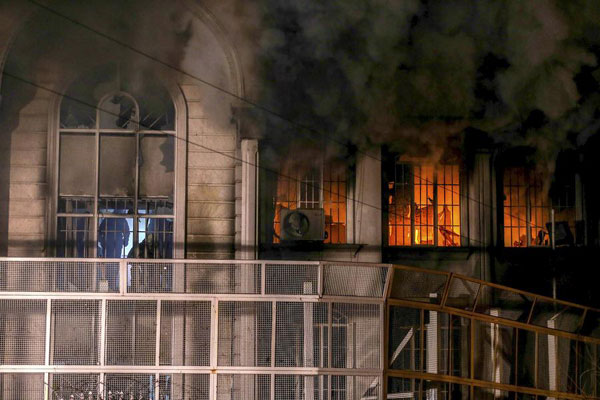Middle East can do without another conflict
Updated: 2016-01-05 13:06
By Wang Jinglie(chinadaily.com.cn)
|
|||||||||
 |
|
Flames and smoke rise from Saudi Arabia's embassy during a demonstration in Tehran January 2, 2016. Iranian protesters stormed the Saudi Embassy in Tehran early on Sunday morning as Shi'ite Muslim Iran reacted with fury to Saudi Arabia's execution of a prominent Shi'ite cleric. [Photo/Agencies] |
Saudi Arabia severed diplomatic ties with Iran on Monday and asked all Iranian diplomats to leave the country within 48 hours after angry Iranian protesters stormed the Saudi embassy in Teheran in protest against the execution of 47 people, including prominent Shi'ite imam Nimr al-Nimr, on terrorism charges by Riyadh. Following Saudi Arabia's move, Sudan, Bahrain also said they would sever ties with Iran as United Arab Emirates said it would downgrade ties with Teheran.
The United Nations, the United States and the European Union all condemned the latest executions carried out by Saudi Arabia, and urged countries in the Middle East to not escalate religious tensions further. On the other hand, Iran's supreme leader Ayatollah Ali Khamenei said Saudi Arabia would face "divine revenge" for "unjustly spilling the blood" of Nimr and urged the Islamic world to strongly protest his death.
This is not the first confrontation between Riyadh and Teheran, which for decades have been fighting for the religious leadership in the Middle East. Portraying itself as the de facto leader of the Islamic world, the Sunni Saudi Arabia has prided its guardianship of the holy cities of Mecca and Medina, on which millions of Muslims converge to perform hajj every year. And Iran, as the largest Shi'ite Muslim country, has become a major security concern for many Gulf states, including Saudi Arabia, for not only following a different strand of Islam but also its growing military might.
Having survived the Western economic sanctions over the past decade, Iran has also managed to make notable progress in ballistic missile and submarine research. Besides, The new Shi'ite-majority government in Iraq has fundamentally reshaped Baghdad-Teheran ties, to the benefit of the latter. And even the regional political upheaval, or the so-called Arab Spring, failed to create unrest in Iran.
As such, the latest confrontation between Iran and Saudi Arabia has a lot to do with the latter attempting to contain the former's rise. Also, the confrontation has highlighted the fact that Islam as a religion stands divided, not least because of non-religious factors.
Related Stories
Saudi Arabia severs ties with Iran after attacks 2016-01-05 07:57
Iran says not seeking tension with Saudi Arabia 2016-01-04 21:02
Saudi Arabia executes 47 on terror charges, including Shi'ite cleric 2016-01-02 16:16
Saudi Arabia forms Islamic 34-nation military alliance 2015-12-16 08:08
Iran nuclear deal must avoid destabilizing region: France, Saudi Arabia 2015-05-05 11:50
Saudi Arabia bombs Shiite stronghold 2015-03-28 08:12
Today's Top News
Inspectors to cover all of military
Britons embrace 'Super Thursday' elections
Campaign spreads Chinese cooking in the UK
Trump to aim all guns at Hillary Clinton
Labour set to take London after bitter campaign
Labour candidate favourite for London mayor
Fossil footprints bring dinosaurs to life
Buffett optimistic on China's economic transition
Hot Topics
Lunar probe , China growth forecasts, Emission rules get tougher, China seen through 'colored lens', International board,
Editor's Picks

|

|

|

|

|

|







